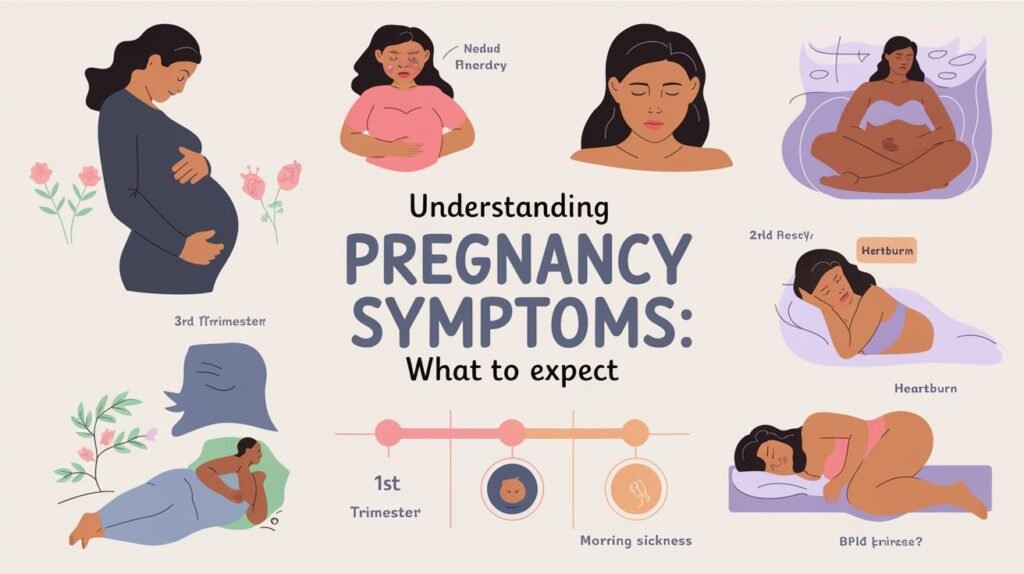Understanding Pregnancy Symptoms: What to Expect
Curious about pregnancy symptoms? Discover the common signs of pregnancy, when they may occur, and how to manage them as your body prepares for a new life.
Introduction: The Journey Begins

Pregnancy is an incredible journey, but it comes with its fair share of changes and surprises. Whether you’re trying to conceive or have just learned the exciting news, understanding the common pregnancy symptoms can help you navigate this beautiful yet challenging time. Here’s a look at what to expect!
1. Missed Period
One of the first signs that you might be pregnant is a missed period. If your menstrual cycle is regular and you suddenly skip a month, it could be time to take a pregnancy test.
- When it happens: Typically noticeable a few weeks after conception.
- What to do: Take a home pregnancy test or consult with your doctor for confirmation.
2. Morning Sickness
Ah, morning sickness! This delightful symptom can hit at any time of day, not just in the morning. It often includes nausea and vomiting, which can be challenging but usually subsides after the first trimester.
- When it happens: Commonly starts around weeks 6-8 and can last until about week 12.
- How to cope: Keep snacks by your bed, eat small meals throughout the day, and stay hydrated. Ginger can also help alleviate nausea.
3. Fatigue
Feeling more tired than usual? Fatigue is a common symptom during early pregnancy, caused by hormonal changes and your body’s increased effort to support the developing baby.
- When it happens: Often begins in the first trimester and may persist throughout pregnancy.
- How to cope: Listen to your body and rest when you need to. Short naps and a balanced diet can help boost your energy.
4. Breast Changes
You may notice some changes in your breasts, such as tenderness, swelling, or darkening of the areolas. These changes are due to hormonal fluctuations as your body prepares for breastfeeding.
- When it happens: Usually starts in the first trimester.
- What to do: Wearing a well-fitted, supportive bra can help ease discomfort.
5. Frequent Urination
As your pregnancy progresses, you might find yourself running to the bathroom more often. This is due to hormonal changes and the growing uterus putting pressure on your bladder.
- When it happens: Can start as early as six weeks and often increases in the later stages of pregnancy.
- What to do: Stay hydrated, but try to limit fluid intake before bedtime to avoid nighttime trips to the bathroom.
6. Food Cravings and Aversions
Pregnancy often brings on unusual food cravings or aversions. You might find yourself suddenly craving pickles and ice cream or feeling repulsed by foods you once loved.
- When it happens: Typically starts in the first trimester and can continue throughout pregnancy.
- What to do: Listen to your body, but try to maintain a balanced diet. It’s okay to indulge occasionally!
7. Mood Swings
Thanks to hormonal changes, mood swings can be a common experience during pregnancy. You might feel excited one moment and tearful the next.
- When it happens: Can start early and may continue throughout pregnancy.
- How to cope: Practice relaxation techniques, talk to supportive friends or family, and consider joining a prenatal class to connect with others.
8. Constipation
Hormonal changes can slow down your digestive system, leading to constipation. It’s a common yet uncomfortable symptom many women experience.
- When it happens: Can start early in pregnancy.
- What to do: Stay hydrated, eat plenty of fiber-rich foods, and consider gentle exercise to help keep things moving.
9. Headaches
Increased blood volume and hormonal fluctuations can lead to headaches during pregnancy. While they can be frustrating, there are ways to manage them.
- When it happens: Often occurs in the first trimester and can continue later.
- What to do: Stay hydrated, get enough rest, and consider safe over-the-counter pain relief after consulting your doctor.
10. Back Pain
As your body changes to accommodate your growing baby, back pain can become a common complaint, especially in the later trimesters.
- When it happens: Usually increases in the second and third trimesters.
- What to do: Practice good posture, consider prenatal yoga, and use a firm mattress to support your back.
Conclusion: Every Pregnancy is Unique
Every woman’s pregnancy journey is different, and while these symptoms are common, you may experience some, all, or none of them. If you have concerns about your symptoms or how you’re feeling, don’t hesitate to reach out to your healthcare provider. They can provide guidance and support as you navigate this incredible experience.







